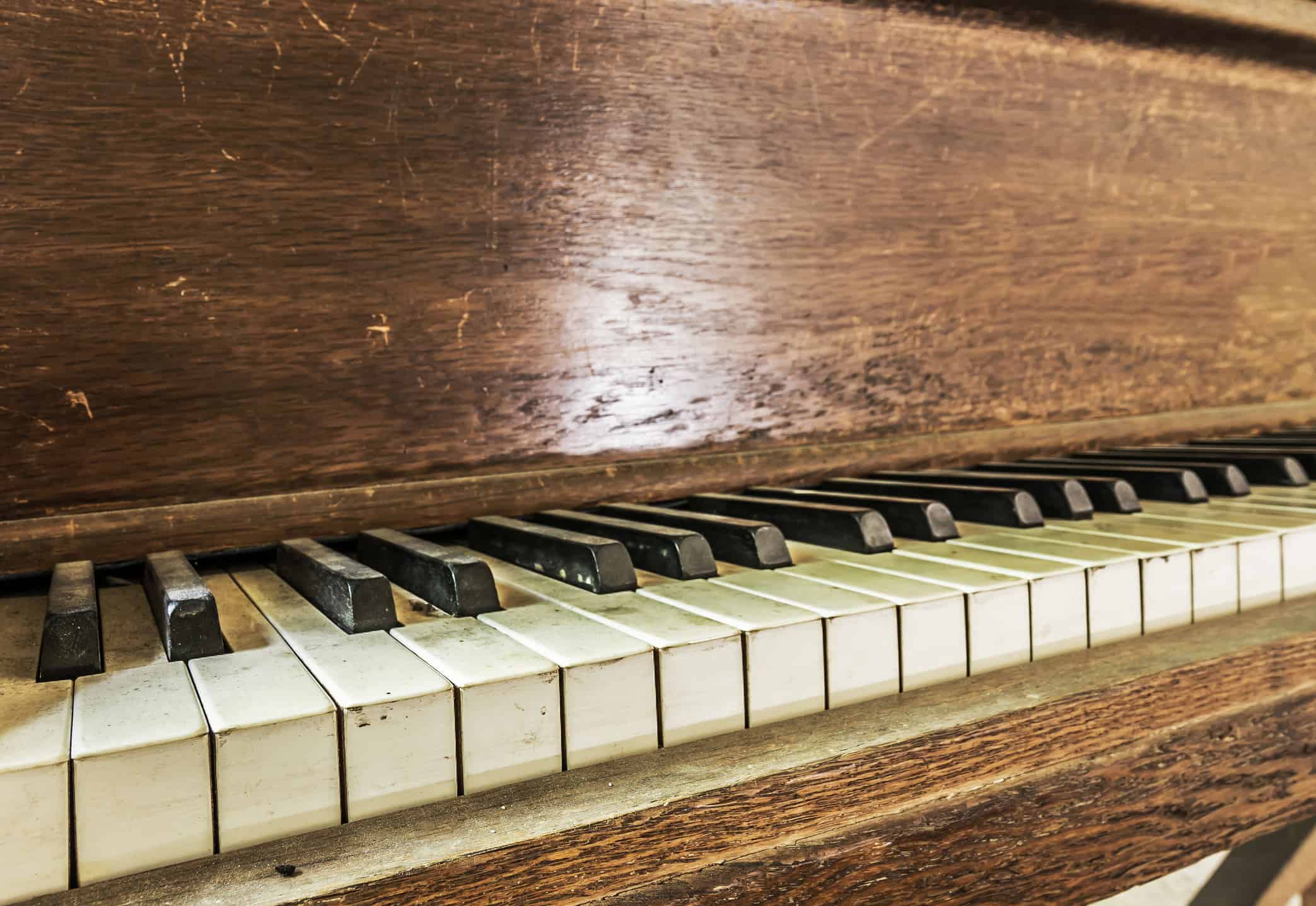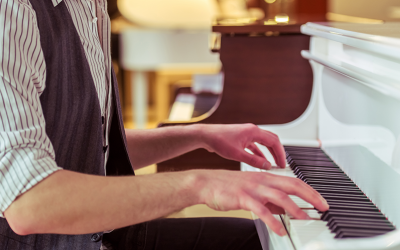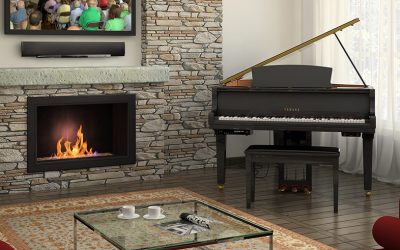
Why Are There So Many Free Pianos?
One of the main reasons a piano will be offered for free is because it no longer has the value or quality for it to be sellable. Pianos hold their value for 30-50 years, depending on brand; after that, most pianos have become so worn that they experience multiple issues that make the piano valueless.
Although a free piano may seem enticing to some prospective buyers, in most cases the piano is not in a state of producing a good quality sound or may require repairs that are more expensive than purchasing a higher-quality used piano.
The Downfalls of Free Pianos
Getting rid of an old piano can feel daunting to a piano owner. If you’re unable to sell the piano through local classifieds and if a piano store is not interested in selling the piano on consignment, a piano owner may feel stuck with this bulky instrument. This is especially true if there is a time sensitive reason for getting rid of the piano.
However, most pianos hold their value for several decades and are relatively easy to sell, trade in, or give to a piano store to sell on consignment. Most piano owners who are giving away a piano for free have already tried these routes to no avail. Instead of the expenses associated with taking a piano to the dump (including using or finding movers, renting a truck, and disposals), the “hail mary” effort of these instrument owners is to place the piano up for free on a classifieds site.
The good news is that if you accept one of these free pianos, you’re unburdening the previous owner of the challenge of figuring out what to do with it. The bad news, however, is that the piano will likely require expensive repairs to play at any level of actual quality–if it can be repaired at all.
What are Common Issues of Free Pianos?
If a piano hasn’t been able to be sold by the owner or put up for consignment in a piano shop, it’s likely to have one of the following issues:
Can’t Hold Tune
One of the most common issues with free pianos is that they can’t hold a tune. This may seem like a relatively simple fix, but in reality, it can be complex, expensive, or even impossible. The components required for a piano that stays in tune include tight and stable tuning pins in a stable, undamaged, quality pin block. In some cases, a piano repairman may be able to replace a missing pin or tighten a loose pin using a special glue or by replacing the pin with a slightly larger one. However, these fixes may not be long-lasting.
In addition, if the pin block is severely damaged or missing altogether, it will require a complete piano rebuild which will almost certainly be more expensive than purchasing a quality used or digital piano.
Buzzing
Many free pianos have an obnoxious buzzing sound when the piano is played. This is typically the result of a damaged soundboard. For instance, some of the ribs may have become loose over time, or may even have cracked due to temperature fluctuations. This problem can sometimes be resolved by a piano technician; however, you’ll want to have the technician take a look before taking on the piano, otherwise you might wind up with expensive repairs or a piano that you now have to dispose of.
Missing or Tarnished Strings
Before you accept one of the many free pianos available, take a careful look to ensure no piano strings are missing. If a piano owner is trying to give away a piano for free, they may mention the strings but suggest that they’re easy to replace, such as how guitar strings are simple and inexpensive replacement parts. However, on a piano, the replacement process isn’t nearly so easy.
Strings can sometimes be replaced, but doing so means the string is less likely to hold its tune over time. In addition, the string will have a different tone than the rest of the notes, making it stand out (and not in a good way) when you play.
Missing or Broken Hammers
The hammers are the component of the piano that is engaged by the piano key and results in the hammer striking piano strings to produce sound. It’s common for older pianos to have worn or missing felt on these hammers–or have hammers that are missing entirely. In some cases, felt with a deeper groove may be able to have small amounts of felt to be removed to improve the note sound, but replacing the felt or a hammer itself can be costly.
Insect Infestation
Another reason someone may be anxious to offer a piano for free may be because of insect infestation. We wish we didn’t have to warn about it, but the truth is that some homeowners will try to pawn off a piano that has an infestation of wormwoods, moths, woodlice, or termites.
Don’t Forget Delivery & Disposal
Even if a piano is free, it should be moved carefully to prevent any additional damage from befalling the instrument. It’s wise to utilize a professional piano moving service to ensure the piano is protected during transit.
If you’re taking on a free piano, it’s also wise to remember that you’re probably the last piano this owner will have, making you responsible for the disposal when the time comes.
Alternatives to Accepting a Free Piano
Instead of accepting a free piano, which can typically end in costly repairs or frustration, our piano experts recommend purchasing a reasonably-priced used piano. Used pianos from reputable dealers tend to be higher quality and have fewer (if any) required repairs to play.
If no used pianos seem to fit your needs, many customers also consider purchasing a digital piano. Modern digital pianos, especially the prestigious Yamaha Clavinova digital pianos, have advanced playability and sound. These pianos can be purchased for as little as $2,899 for a great-quality, new digital piano. Another benefit: they last 15-20 years if they’re cared for.
You may also be interested in...
Guide: How to Define the Sound of a Piano
Are you looking to purchase a new or used piano and wondering how to describe the piano sound you want to find? Or perhaps you are selling a used piano and unsure the best words to describe the sound of your piano? This guide can help! What words describe the sound...
15 Questions to Ask When Buying a New Piano
15 Questions to Ask When Buying a New Piano It can be exciting to buy a new piano for your household! If it's your first time buying a piano or if you're preparing to find the best piano for your needs, this list of questions to ask when buying a new piano can help!...
Piano Sale – Up To $1000 Rebate on Select Yamaha Pianos!
Huge Piano Sale in Utah Going on Now - up to $1000 Rebate on 20+ Piano Models! This February, Piano Gallery is teaming up with Yamaha to provide HUGE rebates on new Yamaha Piano purchases. Receive up to $1000 rebate on select Yamaha pianos if purchased...
Digital Piano Vs. Acoustic Piano – What to Consider
When you're looking to buy a piano, you may be overwhelmed with options. Should you buy a new or used piano? What size of piano should you buy? What is the best piano brand in your price range? One of the most common questions we are asked is what the benefits are of...
Piano Terms, Sizes, & Styles
Acoustic Piano Acoustic pianos are traditional pianos that use metal strings, soundboards, and hammer to produce sound through vibration. Vertical Pianos Instead of strings resting horizontally as in a grand piano, vertical pianos have vertical soundboards and...



